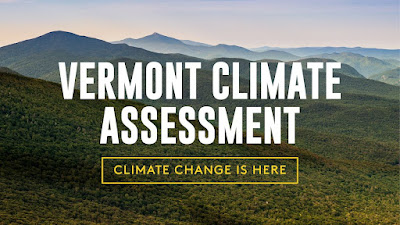 |
| A climate assessment for the Green Mountain State shows us more big changes are coming to Vermont in the coming decades. |
The findings are not surprising (at least to me) and match climate data from other sources, but the assessment does serve as a great blueprint on how we will need to navigate further effects from climate change.
Ski areas will need to adapt to shorter snow seasons. More intense storms means we'll have to continue fortifying ourselves for more intense floods.
Agriculture will also have to deal with that increased risk of excessive rain, with wild jolts into drought occasionally to make things even more complicated. Forests and wildlife will change.
The report was produced by the University of Vermont's Gund Institute for Environment and released earlier this month. The whole report is a follow-up to a similar 2014 Gund Institute study. As Seven Days reports, that 2014 assessment was the first in the United States to examine climate change at a state level.
Two of the key takeaways from the report are that winters are warming faster than the other seasons and snow season is growing shorter. Also, precipitation events are getting heavier, leaving Vermont more prone to flooding.
Those floods sweep crud, nutrients and silt into rivers, ponds and lakes, which wrecks water quality and increases the chances of algae blooms, some of which can be dangerous and poisonous.
The report tells us that Vermont's average annual temperature has increased by almost 2 degrees since 1900. Winter temperatures are up 2.5 times faster than the overall annual temperatures over the past 60 years. The number of very cold nights has decreased by over seven days in the same time period.
Vermont, as we know, is really forested. It will probably remain that way, but your grandchildren will probably see a very different forest when they're old than you do now. The familiar sugar maples, balsam fir, yellow birch and black oak will be less prevalent than they are now by 2100. In their stead will be more northern red oak, shagbark hickory and black cherry.
It will be a gradual process, as the older species slowly die out and young new species take over.
It's also possible climate change will make iconic Vermont species like the common loon and hermit thrush disappear from the state in the coming decades, according to the report.
One finding that stuck out for me is this, from the report's executive summary. Average annual precipitation is up 21 percent since 1900 in general, but is becoming more variable. BUT, as the executive summary states:
"Vermont is also becoming wetter......However, Vermont still experiences prolonged droughts because of shifts in the water cycle, and different regions of Vermont can experience different climate impacts."
There was a classic example of this during the past summer. Southern Vermont was sopping wet, and experienced damaging floods. At the same time, far northern Vermont was gripped by drought.
An interesting note in the climate report is something I've brought up previously. The effects of climate change in Vermont will be big and noticeable and impactful, but perhaps not as dire as in other parts of the nation, or the world.
Will that mean Vermont will become a haven of sorts from climate change?
As Seven Days reports, the latest Vermont climate assessment doesn't see any evidence yet that people are flocking to the Green Mountain State to avoid the worst of climate change. Honestly, things have not gotten that dire yet for most Americans.
The pandemic has been a cautionary tale, however, as people stampeded into Vermont from cities as the crisis took hold, hoping to avoid the crowds and contagion of cities. For better or worse, I guess.
I've lived in Vermont all of my life (so far!). I've always been attuned to what nature is doing out there in any given moment. I can tell you things are much different from when I was a kid. I won't list them all, but I've noticed winters are far more variable, summers are hotter, spring is earlier and most autumns are later than they used to be.
As the latest Vermont climate assessment shows, we can expect perhaps even bigger changes in the coming decades as the world continues to warm.

No comments:
Post a Comment